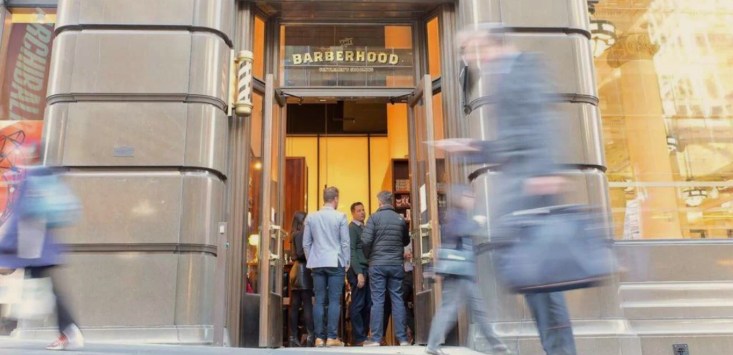
The Barberhood site in Martin Place, Sydney. Source: Supplied
Fresh commentary from Reserve Bank of Australia (RBA) governor Michelle Bullock has one barbershop founder “in shock” after she suggested lower spending at hairdressers and salons could help the fight against inflation.
Speaking at a meeting of business economists in Sydney, Bullock last night said domestic challenges have largely overtaken international supply chain disruptions as a driving force behind inflation.
In particular, the governor said domestic demand, “increasingly underpinned by services”, is driving inflationary pressures.
Demand is still outstripping supply in key sectors, meaning businesses are lifting their prices to compensate for the cost of providing those in-demand services.
“Hairdressers and dentists, dining out, sporting and other recreational activities – the prices of all these services are rising strongly,” she said.
Australia’s headline annual inflation rate was 5.4% in October, below its recent peak of 7.8% in December 2022, but still far above the RBA’s target band of between 2% and 3%.
Bullock said it may take two years for the inflation rate to fall that far.
“Much of the remaining task of bringing inflation back to target will require bringing aggregate demand and aggregate supply into closer alignment,” she said.
The challenge facing the RBA is that it has no direct power to solve the supply-side pressures, and can only lower demand by increasing interest rates.
“That is what the [RBA] Board is aiming to do with monetary policy – to slow the growth of demand enough to bring inflation back to target while keeping employment growing,” Bullock added.
Demand already falling before Christmas, barbershop says
Renée Baltov is the founder and director of The Barberhood, which operates two Sydney barbershops — one of which is located on Martin Place, a stone’s throw from the RBA headquarters.
Despite the physical proximity, Baltov says Bullock’s comments overlook the very real financial challenges facing hairdressers and barbers today.
“When I read that article this morning, I just was in shock,” Baltov told SmartCompany.
Demand has fallen considerably in recent months compared to years prior, Baltov said, suggesting today’s business challenges are not yet captured by the RBA’s data.
“We’re not buying the same amount of stock we would coming into the Christmas period,” she said.
“People are holding off on their haircuts before Christmas, which is usually a busy period.
“I was looking at my own numbers, and we’re probably about 40% down on a good year… People are definitely not booking and spending the same amount of money going into Christmas.”
Any further decline in demand would have a profound effect on barbershops and hairdressers which are already struggling with rising input costs for everything from electricity to water.
Baltov herself is aware of six hairdressing businesses that have closed their doors in the past month because of those challenges.
Not every service business has hiked prices yet, either: Baltov said The Barberhood has raised prices three times in eight years, with the last hike coming in 2020.
Sandy Chong, CEO and chair of the Australian Hairdressing Council, defended the right of hairdressers to increase their prices to make up for rising costs.
“Good on any business for raising their prices” in order to keep operating, she told SmartCompany.

The Barberhood’s Martin Place site in October. Source: Facebook/ The Barberhood
RBA acknowledges strain on households
In her speech, Bullock acknowledged how lifting interest rates to reduce demand will rattle parts of the Australian community.
“I know that my message tonight will not resonate with some,” she said.
“I receive letters from people who are finding it difficult to make ends meet and I speak with organisations that assist struggling households.”
However, “the Bank’s statutory objectives are economy-wide outcomes, and our key tool – the interest rate – is a blunt one,” she continued.
“The Board must therefore set its policy to serve the welfare of Australians collectively.”
Inflation itself has a “particularly severe impact on low-income households,” Bullock said.
Even so, Baltov said the big end of town should pay closer attention to the struggles of small businesses.
“I don’t think governments and bigger businesses really understand how hard it is,” she said.
“And it’s not like someone will just lose a job. We lose our livelihood. We lose our ability to feed our family, we lose the ability to pay our mortgage, it has a direct effect on my immediate family.”
Skills shortage not fixable with interest rates alone
The RBA’s goal of “bringing aggregate demand and aggregate supply into closer alignment” will be compounded by what Chong has described as urgent supply-side challenges specific to the hairdressing sector.
Jobs and Skills Australia data shows hairdressers are in shortage nationwide, and the agency last week said traditional online job ads are failing to make up the gap.
The problem, as Chong sees it, is that there are not enough domestic workers who have the skills and experience to fill the salon vacancies nationwide.
Although the federal government is working to boost apprenticeship uptake and completion rates, it will take some time for locally trained workers to enter the field.
At the same time, hairdressers say the recent lift to the temporary skilled migrant income threshold makes it too expensive for many businesses to recruit hairdressers and barbers from overseas, exacerbating today’s skills shortage.
Baltov said her business tried to bolster its ranks with overseas talent before the most recent drop-off in demand.
While the RBA has no direct way to alter migration pathways, Bullock last night voiced her support for continued immigration.
“Immigration, in general, is a good thing for Australia,” the governor reportedly told journalists in a Q&A session after her speech.
Handpicked for you

Cost of living pressures see young people cut back on essentials



COMMENTS
SmartCompany is committed to hosting lively discussions. Help us keep the conversation useful, interesting and welcoming. We aim to publish comments quickly in the interest of promoting robust conversation, but we’re a small team and we deploy filters to protect against legal risk. Occasionally your comment may be held up while it is being reviewed, but we’re working as fast as we can to keep the conversation rolling.
The SmartCompany comment section is members-only content. Please subscribe to leave a comment.
The SmartCompany comment section is members-only content. Please login to leave a comment.